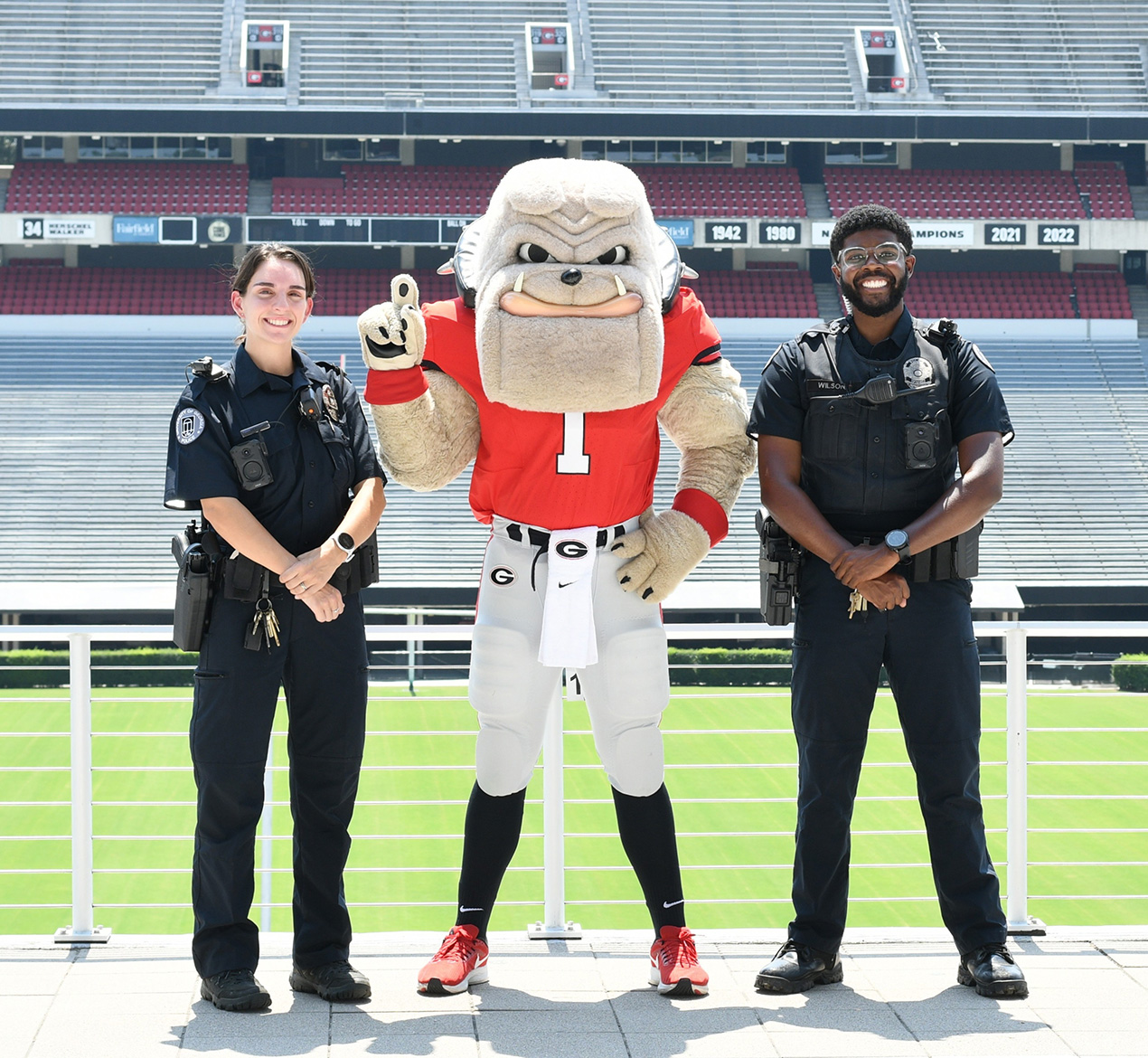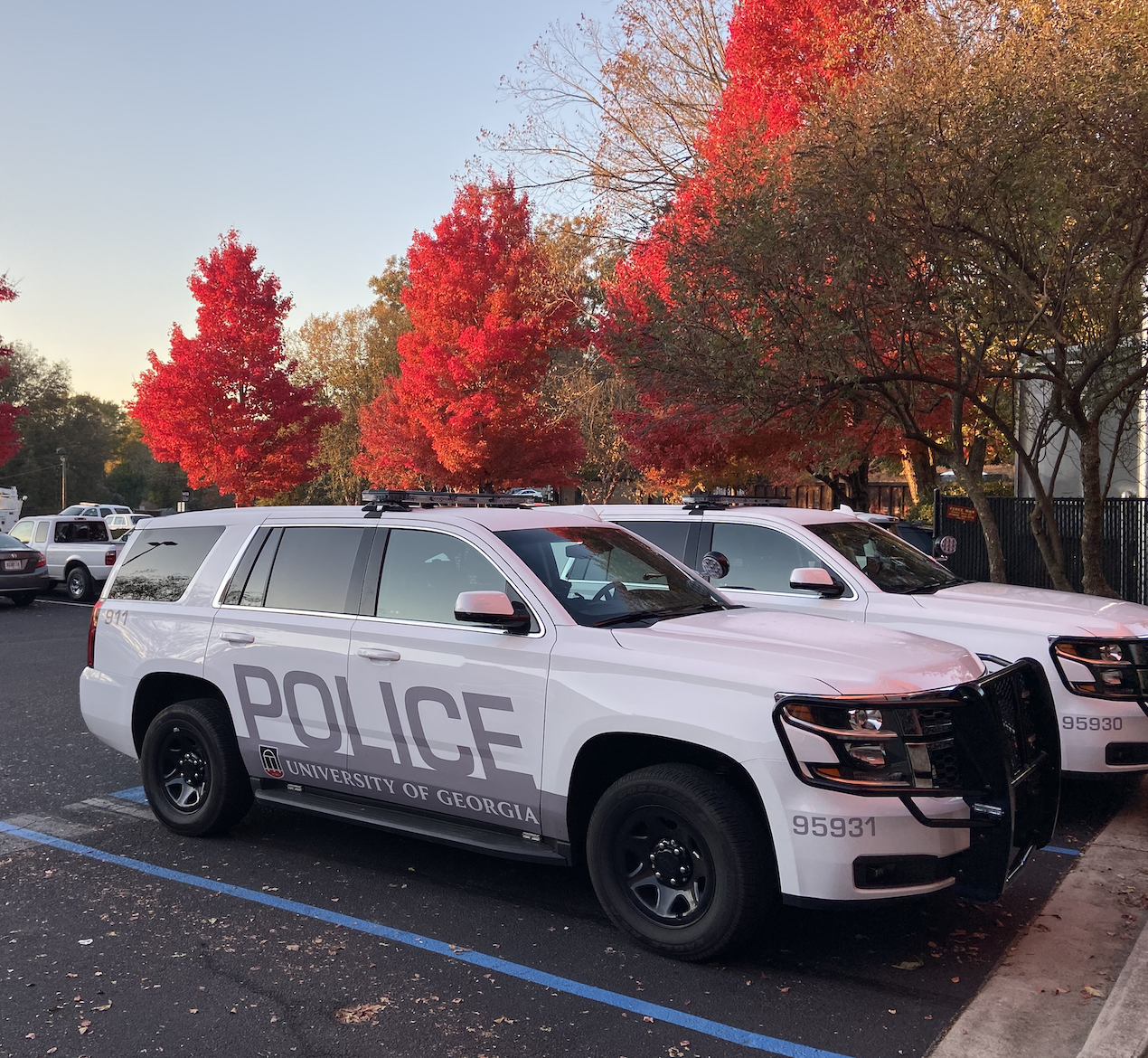The Bureau is commanded by a Deputy Chief that is responsible for the Uniform Patrol Division, Traffic Unit and Criminal Investigation Division.
Uniform Patrol Division
The Patrol Division consists of highly trained men and women whose charge is to protect and serve the University community. Operating year-round and 24 hours per day, the Patrol Division is consistently striving for ways in which the University community can continue to be a safe and secure learning environment.
Service
Making up more than two-thirds of our Department’s personnel, our patrol officers perform a variety of functions aimed at building and sustaining a safe learning environment for the University of Georgia, 24 hours a day, 365 days a year. The Division is the largest and most visible aspect of the Police Department, and serves at the forefront of police operations. Patrol officers recognize that a service-oriented attitude is a vital part of effective policing, and our personnel work actively to maintain the positive police-community relationships we value. Whether on patrol, responding to emergency calls for assistance, or simply providing information about our campus, our uniformed officers are here to ensure that your experience on campus is a safe one.
Safety
The primary focus of the Patrol Division is ensuring the safety and security of the University community, including students, employees, and visitors. This goal is accomplished daily through routine patrols, traffic enforcement, response to calls for assistance, and public engagement. Most often, our officers work in uniform and operate patrol vehicles, motorcycles and bicycles. However, given the ever-changing environment of the University community, patrol officers and supervisors utilize and adapt their patrol techniques, and use strategies such as foot patrol and outreach to meet the needs of the community.
Excellence
Our department is deeply committed to maintaining the highest level of professionalism in order to fulfill its mission. To facilitate this, our officers engage in a number of advanced training courses, which enable them to stay on the cutting edge of current legal decisions and modern police tactics. Each newly-hired officer attends a 408-hour basic law enforcement course at one of the state’s regional police academies. Once certified, officers undergo a rigorous field training program within the Department to build their understanding of the decision-making and problem-solving expected of our personnel. All officers can expect to attend advanced training courses that focus on topics such as constitutional policing, communications skills, mental health crisis response, advanced defensive tactics techniques and firearms training.
Traffic Unit
The University of Georgia Police Department established the Traffic Unit to focus on roadway safety in the University community. Officers assigned to the Traffic Unit receive a great deal of advanced training on topics related to traffic safety and accident investigation, and use a combination of data analysis and thoughtful traffic enforcement strategies to reduce the number of crashes on or near campus. The Traffic Unit also offers educational opportunities for the UGA community, with an emphasis on minimizing traffic and pedestrian accidents.
Criminal Investigation Division (CID)
The University of Georgia Police Department Criminal Investigation Division (CID) is a full-scale detective bureau equipped to handle a wide variety of investigative tasks. CID personnel are responsible for following up on all crimes reported on the University of Georgia campus, as well as numerous other tasks.
CID is tasked with investigating a variety of criminal complaints here at the University of Georgia, as well as many University of Georgia properties throughout the State. Investigators are trained in a number of areas, including criminal investigations, interviews and interrogations, crime scene and latent fingerprint processing, homicide investigations and electronic surveillance. Each year, CID detectives investigate over one thousand criminal complaints on and around the University of Georgia campus.
Dignitary Protection / Taskforce Participation
Investigators also perform a wide variety of other investigative and administrative functions to serve the University of Georgia community. One such function is to provide protection for visiting dignitaries, who have included former U.S Presidents, foreign Heads of State, Senators, Congressmen, Supreme Court Justices and Governors. Investigators also routinely work with surrounding law enforcement agencies on multi-agency taskforces in response to crimes that affect multiple communities. Our investigators have taken part in many successful joint investigations that culminated in violent offenders being taken off the streets.
Investigative Capabilities
From death investigations to theft of property, CID has the responsibility and training to fully investigate all reported incidents. In recent years, the division routinely investigates all types of criminal complaints, including persons crimes, identity theft and computer related crimes involving the University of Georgia community. Investigators are trained in computer forensics and other techniques to effectively combat these types of crimes.
Forensic Capabilities
In addition to the CID’s investigative abilities, our division is trained and equipped to perform the majority of forensic examinations that cases may require in-house—from the collection of DNA and other biological evidence, to the identification of latent fingerprints. Investigators receive and process hundreds of pieces of evidence each year. Numerous offenders are identified and arrested as a result of this work. Other forensic capabilities of the University of Georgia Police Department include computer forensics, drug testing and identification; tire and footwear impression casting; latent fingerprint development; hair, fiber and trace evidence collection; blood pattern analysis; and general crime scene processing. Providing training to investigators in such a broad range of areas not only reduces dependence on the Georgia Bureau of Investigation Crime Lab for forensic and investigative services, but it enables the University of Georgia Police Department to provide a more thorough and timely service to the University community.



